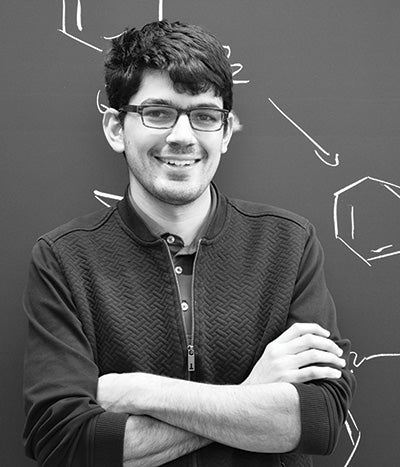Scalable, Economical — and Recyclable
Julian Cooper’s research focuses on a more sustainable future for thermosets.

As an undergraduate at Rice, Julian Cooper ’14 first discovered his love of chemistry. “It just clicked,” he said. After completing his Ph.D. in chemistry at MIT, Cooper began working at the University of Illinois at Urbana-Champaign as a postdoc fellow in the lab of Jeff Moore, professor of chemistry and of materials science and engineering, where he applies chemical tools and principles to problems in materials science. “One such problem I am addressing is sustainability in thermosetting polymers, or thermosets,” Cooper said.
Thermosets are ubiquitous and prized for their mechanical properties. They can be found in everyday items, such as rubber tires, and high-performance applications, such as airplane and windmill components. Many of the beneficial properties of these thermosets arise from crosslinks — connections between polymer strands — in the material. This makes the materials tough and durable and inhibits their flow — vital properties for materials used in high-performance applications.
But these same crosslinks pose challenges for recycling thermosets. When they reach the end of their lifespan, thermosets can’t be melted or remolded into new materials without losing many of their properties, so they end up in waste streams. “Thermosetting plastics are everywhere, and their production has become easy and inexpensive. For the longest time, we’ve been concerned about how to make better materials, never thinking about what happens to them when they are no longer usable. We’re just accumulating materials that become waste in landfills,” said Cooper.
Ultimately, the goal is to be able to manufacture materials — in a way that is both scalable and economical — that can meet desired performance requirements but also can be recycled at the end of their serviceable lifetime. “What I’m trying to do is take this concept that’s emerging in materials science of putting chemical functionality in these crosslinks so they will operate the way we want them to but then can be thermally reprocessed to recapture the original performance,” said Cooper. “That’s effectively what I’m looking at: a little bit of chemistry, a little bit of engineering, a whole lot of materials science that I’m learning on the fly.”
Cooper is excited about the possibilities for his research. “In the long term, it helps address a very real issue that’s in front of our faces. I’m not saying that I’m going to solve the plastics crisis and the waste problem. But I get to apply my skill set in a space that has many approaches to the problem, and I get to contribute uniquely in that. I think that’s very cool.”
— Jenny West Rozelle ’00
